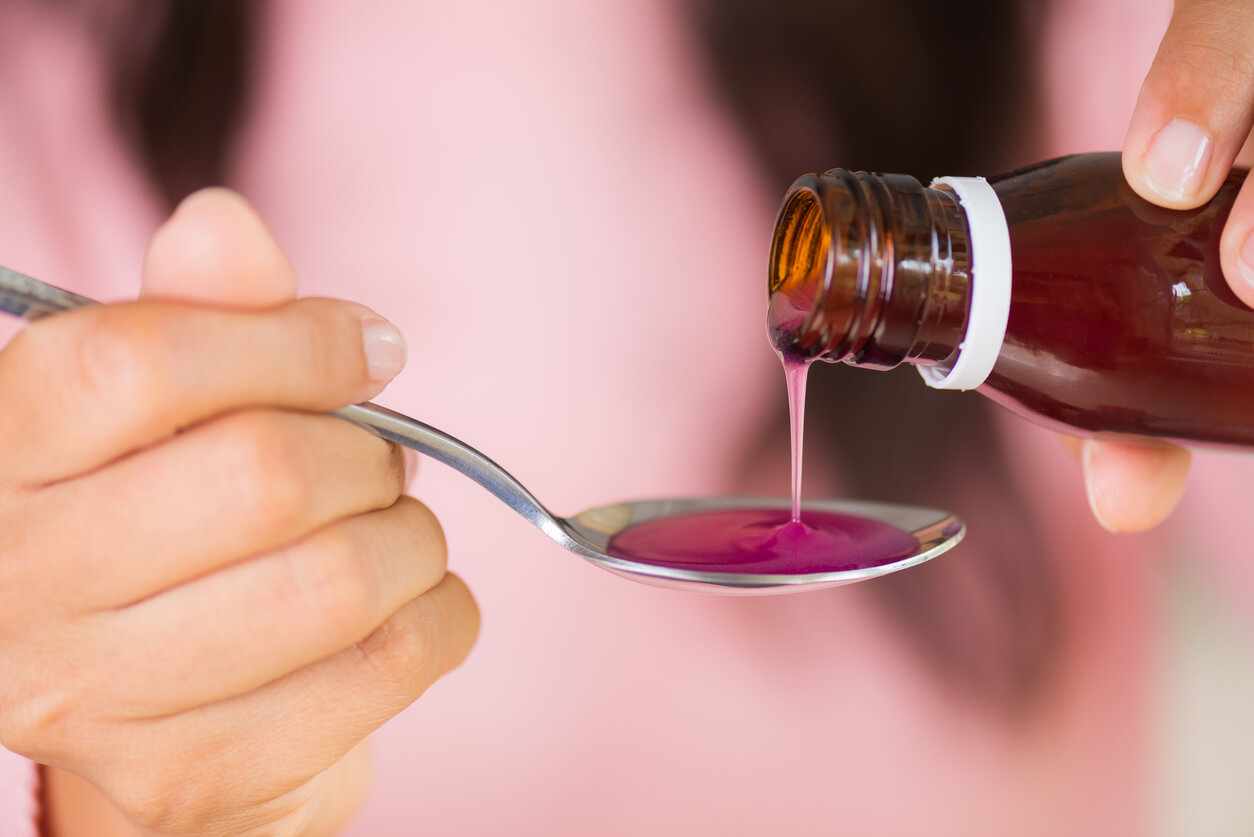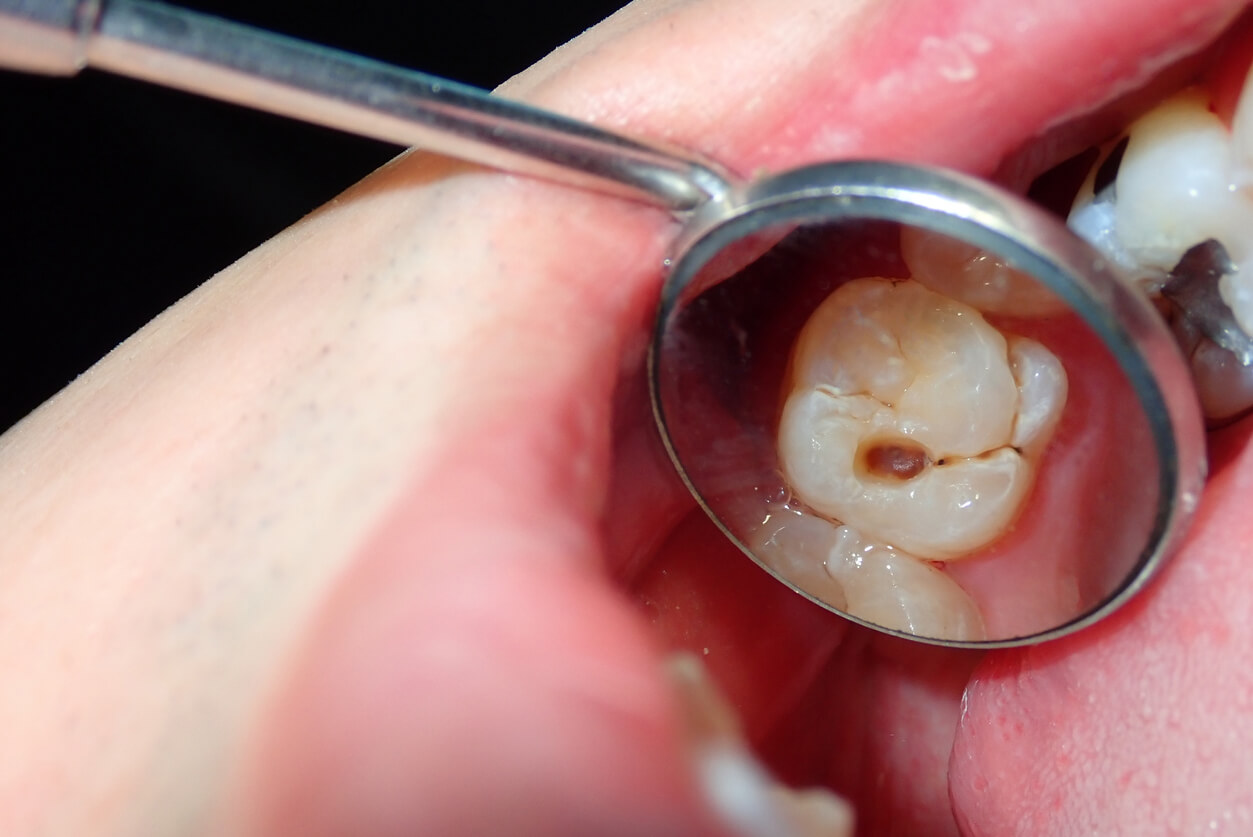Medications and Cavities: What's the Relationship?


Written and verified by the dentist Vanesa Evangelina Buffa
Are you aware of the relationships between medications and cavities? It’s common for parents to have to resort to the use of certain drugs to alleviate certain illnesses that afflict their little ones. Therefore, in the chaotic moment when our child has a fever, pain, or a bad cough, the last thing we think about is whether these medications can cause tooth decay.
However, some of the components of the medications can alter dental health. The sugar content, flavorings, or side effects of the medication itself, affect the balance of the mouth and favor the appearance of cavities.
Many parents are unaware of this information and some pediatricians forget to clarify it. In this article, you can discover the relationship between the use of certain medications and the development of cavities. This way, you’ll know how to protect your child’s mouth.
Learn about the relationship between medications and cavities
As we’ve already mentioned, the use of certain medications can favor the appearance of cavities in children’s mouths. There are two main reasons for this:
- Medications for children contain sugar, such as sucrose and fructose, to improve their taste and be more acceptable to children.
- Some drugs alter the quantity and quality of saliva.
Sweet medicines

Some syrups, drops, and suspensions for children contain sweeteners that are added to make them more palatable. Therefore, in order to make children cooperate with the intake of the remedies, components that are harmful to oral health are added.
If there’s no adequate oral hygiene after taking the medications, the sugar they contain is used by bacteria in the mouth. When this substance ferments, acids are produced that demineralize the teeth and give rise to cavities.
Dry mouth or xerostomia
Xerostomia is the name given to the reduced production of saliva and the resulting dry mouth. Some medications used in children, such as those prescribed to treat asthma, allergic rhinitis, and other respiratory conditions, decrease the amount of saliva in the mouth.
Saliva is a protective fluid that helps prevent cavities. It has antibacterial properties and a rinsing and cleaning effect that helps keep teeth free of debris. In addition, it neutralizes the acids produced by bacteria and keeps the oral pH in balance. Also, the presence of calcium and fluoride in saliva promotes dental remineralization.
Other effects of medications on children’s teeth
There are other conditions in children’s teeth that are associated with the use of certain medications. Here are some common problems:
- Asthma medications: Drugs used to treat asthma are often very acidic. Therefore, they can demineralize tooth enamel if used frequently and for long periods of time. In addition, some of them may favor the appearance of oral candidiasis.
- Anticonvulsants: Treatments for seizures and epilepsy can cause an exaggerated growth of the gums known as gingival hyperplasia. The enlarged gingival tissue covers the dental crown and favors the accumulation of bacterial plaque.
- Tetracycline: The use of this antibiotic during the tooth formation stage causes yellowish or brownish stains on the enamel.
- Fluoride: In adequate amounts, fluoride strengthens teeth and helps prevent cavities, but excessive use during the tooth formation stage can cause white or brown stains and small dimples on the surface, known as fluorosis.
- Antibiotics: The use of high doses of antibiotics during a long period of severe childhood illness can cause defects in tooth development, such as staining or hypoplasia.

How to avoid caries when using medications
It’s important to keep in mind when using medications in children that they can increase the risk of caries. By being aware of this information, some practices can be adopted to help counteract the harmful effects of drugs in the mouth:
- Brush the child’s teeth after each intake or use of medication. If this isn’t possible, at least rinse the mouth with water.
- If possible, avoid administering medication before bedtime or at night.
- When using inhalers, rinse the mouth with water or a fluoride mouthwash.
- Drink plenty of water to counteract the dry mouth caused by medications.
- If the child can chew gum, use sugarless chewing gum to stimulate saliva production.
- Avoid foods and drinks that irritate the mouth and increase dry mouth, such as carbonated soft drinks and acidic fruit juices.
- If the child can swallow tablets or capsules and the dosage of the medicine allows its use, it’s preferable to opt for this type of presentation.
- Ask your pediatrician to prescribe sugar-free medicines.
- Have biannual check-ups with the pediatric dentist in order to detect and prevent problems.
- Use fluoride toothpastes and oral rinses containing fluoride.
Medications and Cavities: Be prepared to avoid damage
When it comes to relieving pain, fever, or other discomforts in your little one, syrups or suspensions are an aid that we don’t hesitate to use. However, you should keep in mind that medications can have some unwanted effects, and an increased risk of tooth decay is one of them.
Being aware of the possibility of tooth lesions after using certain drugs will allow you to be prepared and act accordingly. However, by putting our advice into practice, medications can help your little one feel better, without damaging their teeth.
Are you aware of the relationships between medications and cavities? It’s common for parents to have to resort to the use of certain drugs to alleviate certain illnesses that afflict their little ones. Therefore, in the chaotic moment when our child has a fever, pain, or a bad cough, the last thing we think about is whether these medications can cause tooth decay.
However, some of the components of the medications can alter dental health. The sugar content, flavorings, or side effects of the medication itself, affect the balance of the mouth and favor the appearance of cavities.
Many parents are unaware of this information and some pediatricians forget to clarify it. In this article, you can discover the relationship between the use of certain medications and the development of cavities. This way, you’ll know how to protect your child’s mouth.
Learn about the relationship between medications and cavities
As we’ve already mentioned, the use of certain medications can favor the appearance of cavities in children’s mouths. There are two main reasons for this:
- Medications for children contain sugar, such as sucrose and fructose, to improve their taste and be more acceptable to children.
- Some drugs alter the quantity and quality of saliva.
Sweet medicines

Some syrups, drops, and suspensions for children contain sweeteners that are added to make them more palatable. Therefore, in order to make children cooperate with the intake of the remedies, components that are harmful to oral health are added.
If there’s no adequate oral hygiene after taking the medications, the sugar they contain is used by bacteria in the mouth. When this substance ferments, acids are produced that demineralize the teeth and give rise to cavities.
Dry mouth or xerostomia
Xerostomia is the name given to the reduced production of saliva and the resulting dry mouth. Some medications used in children, such as those prescribed to treat asthma, allergic rhinitis, and other respiratory conditions, decrease the amount of saliva in the mouth.
Saliva is a protective fluid that helps prevent cavities. It has antibacterial properties and a rinsing and cleaning effect that helps keep teeth free of debris. In addition, it neutralizes the acids produced by bacteria and keeps the oral pH in balance. Also, the presence of calcium and fluoride in saliva promotes dental remineralization.
Other effects of medications on children’s teeth
There are other conditions in children’s teeth that are associated with the use of certain medications. Here are some common problems:
- Asthma medications: Drugs used to treat asthma are often very acidic. Therefore, they can demineralize tooth enamel if used frequently and for long periods of time. In addition, some of them may favor the appearance of oral candidiasis.
- Anticonvulsants: Treatments for seizures and epilepsy can cause an exaggerated growth of the gums known as gingival hyperplasia. The enlarged gingival tissue covers the dental crown and favors the accumulation of bacterial plaque.
- Tetracycline: The use of this antibiotic during the tooth formation stage causes yellowish or brownish stains on the enamel.
- Fluoride: In adequate amounts, fluoride strengthens teeth and helps prevent cavities, but excessive use during the tooth formation stage can cause white or brown stains and small dimples on the surface, known as fluorosis.
- Antibiotics: The use of high doses of antibiotics during a long period of severe childhood illness can cause defects in tooth development, such as staining or hypoplasia.

How to avoid caries when using medications
It’s important to keep in mind when using medications in children that they can increase the risk of caries. By being aware of this information, some practices can be adopted to help counteract the harmful effects of drugs in the mouth:
- Brush the child’s teeth after each intake or use of medication. If this isn’t possible, at least rinse the mouth with water.
- If possible, avoid administering medication before bedtime or at night.
- When using inhalers, rinse the mouth with water or a fluoride mouthwash.
- Drink plenty of water to counteract the dry mouth caused by medications.
- If the child can chew gum, use sugarless chewing gum to stimulate saliva production.
- Avoid foods and drinks that irritate the mouth and increase dry mouth, such as carbonated soft drinks and acidic fruit juices.
- If the child can swallow tablets or capsules and the dosage of the medicine allows its use, it’s preferable to opt for this type of presentation.
- Ask your pediatrician to prescribe sugar-free medicines.
- Have biannual check-ups with the pediatric dentist in order to detect and prevent problems.
- Use fluoride toothpastes and oral rinses containing fluoride.
Medications and Cavities: Be prepared to avoid damage
When it comes to relieving pain, fever, or other discomforts in your little one, syrups or suspensions are an aid that we don’t hesitate to use. However, you should keep in mind that medications can have some unwanted effects, and an increased risk of tooth decay is one of them.
Being aware of the possibility of tooth lesions after using certain drugs will allow you to be prepared and act accordingly. However, by putting our advice into practice, medications can help your little one feel better, without damaging their teeth.
All cited sources were thoroughly reviewed by our team to ensure their quality, reliability, currency, and validity. The bibliography of this article was considered reliable and of academic or scientific accuracy.
- Alcalde Rivas, S. E., & Ramos Yovera, S. M. (2022). Estudio in vitro del efecto del salbutamol y salmeterol sobre la superficie del esmalte dental aplicando la técnica de vickers.
- Coutinho, L. S., Moraes, D. C., & de Jesus Campos, E. (2021). Potencial cariogênico e erosivo de xaropes infantis. Revista de Ciências Médicas e Biológicas, 20(4), 601-609.
- Choez Villacis, E. A. (2022). Manifestaciones bucales en pacientes pediátricos asmáticos y su tratamiento odontológico (Bachelor’s thesis, Universidad de Guayaquil. Facultad Piloto de Odontología).
- Scatena, C. (2012). Efeito erosivo de medicamentos pediátricos de uso prolongado no esmalte de dentes decíduos (Doctoral dissertation, Universidade de São Paulo).
- Seguí Garrigós, L. (2017). Manejo de inhaladores: conocimientos y cuidados de Enfermería.
- Hejazi, M. E., Shafiifar, A., Mashayekhi, S., & Sattari, M. (2016). Evaluation of proper usage of glucocorticosteroid inhalers and their adverse effects in asthmatic patients. Tanaffos, 15(1), 9.
- Carhuamaca-Salvador, M., de la Cruz, J. B., Chávez-Rimache, L., & Chumpitaz-Cerrate, V. (2019). Riesgo de caries dental en pacientes pediátricos asmáticos en tratamiento con la terapia inhalatoria de salbutamol y budesonida, Perú. Revista de la Facultad de Ciencias Médicas de Córdoba, 76(4), 222-226.
- Llena Puy, C. (2006). La saliva en el mantenimiento de la salud oral y como ayuda en el diagnóstico de algunas patologías. Medicina Oral, Patología Oral y Cirugía Bucal (Internet), 11(5), 449-455.
This text is provided for informational purposes only and does not replace consultation with a professional. If in doubt, consult your specialist.








